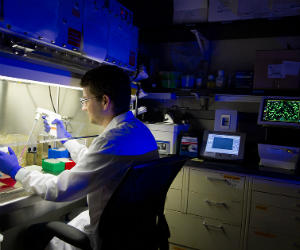Building on its long history of mapping susceptibility genes in cancer-prone families, DCEG investigators were some of the first in the early 2000s to adopt the emerging technology of genome-wide association studies (GWAS), a powerful tool for investigating common inherited variation associated with cancer and other diseases.
The first results using this approach were published in Nature Genetics in 2007 as a part of the pilot multi-institutional project known as Cancer Genetic Markers of Susceptibility (CGEMS), an investigation of >500,000 common inherited variants—known as single nucleotide polymorphisms (SNPs)—and risk of prostate and breast cancer. As the technology improved and processing speed increased, CGEMS expanded to numerous other malignancies, using increasingly complex sequencing techniques.
To accelerate research using the new genetic approaches, DCEG established the NCI Cancer Genomics Research Laboratory (CGR) in 2001. The CGR’s state-of-the-art robotics and genomics technologies provide rapid, high quality preparation and scanning of hundreds of thousands of samples collected through rigorous epidemiological studies.
Today, genotyping, exome sequencing, and analysis are conducted at CGR and at research facilities across the globe, utilizing the massive power of consortia, resulting in the identification of new susceptibility loci for cancer. Colleagues in the co-located Laboratory of Translational Genomics follow up on the markers to determine the functional effects of variants and pinpoint the biological pathways through which these SNPs influence cancer etiology.
Learn about our current research on genetic susceptibility.
